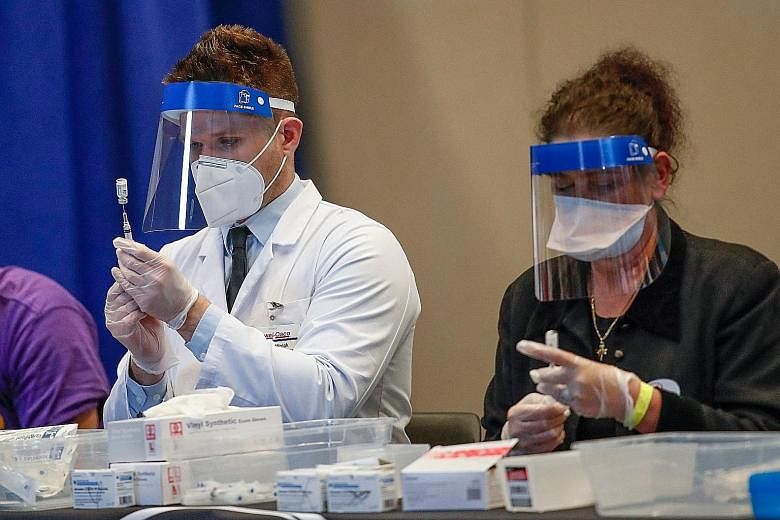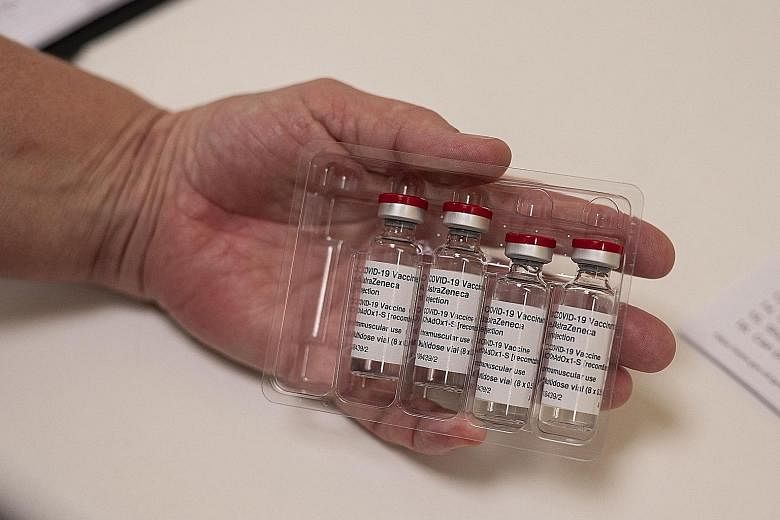The use of the Johnson & Johnson Covid-19 vaccine has been paused in the United States, while countries like Denmark and Germany have halted or restricted the use of the AstraZeneca vaccine, with the health authorities citing the risk of blood clotting as a potential side effect of both vaccines.
This comes after a small number of patients with low levels of blood platelets who received the vaccines experienced cerebral venous thrombosis (CVT), a type of blood clotting in the brain.
The Straits Times speaks to Associate Professor Hsu Li Yang, vice-dean of global health at the National University of Singapore Saw Swee Hock School of Public Health, to find out more.
Q: How common is this side effect and why does it happen?
Prof Hsu: This very rare side effect was discovered because a number of people who were vaccinated with the AstraZeneca vaccine presented with blood clots in the cerebral venous sinuses, which are large veins straining blood from the brain.
Blood clots happening in this part of the body is an extremely rare phenomenon, and the vaccine recipients did not have the kind of risk factors that commonly occur with this condition, such as cancer or some other blood disease. At the same time, they had low platelet counts, which makes this even more unusual.
Currently, the estimated figure is that about four per million first doses of the AstraZeneca vac-cine will result in this very rare phenomenon.
The Johnson & Johnson vaccine side effects have just been uncovered, and it seems to be the same phenomenon, but the scientific reports are not out yet. The risk seems to be even lower than the AstraZeneca vaccine's by a small factor; I think it is one in a million Johnson & Johnson vaccines resulting in this condition.
We don't really understand very much about it, except that in this very small subset of patients who receive the AstraZeneca vaccine, the immune response triggered by the vaccine results in the activation of antibodies that target the platelets in the body, and also results in a higher risk of blood clots forming.
This reaction has been seen with other medications and conditions, in particular this old blood-thinning drug called heparin.
Q: For those who do experience the side effect, how severe is it?
Prof Hsu: When this reaction occurs, it is difficult to treat because the blood clots have already happened in critical parts of the body such as the brain or the lungs. At this point, the risk of death and disability is pretty high.

About one in four of those with such side effects has died. To put it in perspective, that is four in a million people who get this side effect, of whom one will have it bad enough that they can't be saved.
-
AskST
If you have a question, e-mail us at askst@sph.com.sg
The risk of having a blood clot like this is actually lower than getting a blood clot from having an oral contraceptive pill, but, of course, the risk of dying from this is far higher than for the blood clots that form from oral contraceptive pills.
Q: Will this affect our national vaccination programme? Are we still looking to bring these two vaccines into Singapore?
Prof Hsu: I am sure our Health Sciences Authority will look into it and decide whether it would still approve it or not. Currently, because the vaccine roll-out here uses the Moderna and Pfizer vaccines, this doesn't affect us too much yet.
At the end of the day, it is the risk-benefit that matters. How do we assess this risk relative to the benefits that the vaccines can give us?
In a place like Singapore, for instance, where we have hardly any Covid-19 transmission in the community, one in a million is arguably a very high risk.
In places like the US or parts of Europe, where the transmission rates are very high, and the death rate from Covid-19 is far higher than one in a million, then one in a million may seem like reasonable odds.
Q: Researchers at the University of Oxford recently published a study showing that the rate of CVT in patients following a Covid-19 infection is eight times higher than the rate in those who received the AstraZeneca vaccine, and 10 times higher than those who received the Moderna or Pfizer vaccines. What do you make of this finding?
Prof Hsu: The association of CVT with Covid-19 infection was well-described even prior to this study. However, when we look at Covid-19 infection, I think it is better to take mortality risk as a whole.
For people above 55, for instance, the mortality rate is about one in 1,000. If you get Covid-19 and you are above 70, the risk of dying becomes more than five in 100.
If you take collectively all the complications that Covid-19 brings when one is infected with it, then, of course, the risks associated with these vaccines are all lower than the actual risks from Covid-19 infection.
Q: Which demographic groups seem to be at most risk of experiencing the blood clotting following vaccination?
Prof Hsu: We haven't had that many cases yet, but they seem to have occurred in a wide range of recipients, including groups as disparate as younger women and older people.
So, currently, there is no obvious risk factor which predisposes one to get the side effect more than others.
Q: What is next for the AstraZeneca and Johnson & Johnson vaccines? Will further studies shed more light on the blood clotting side effect?
Prof Hsu: We may better understand the mechanisms by which the adverse effects take place, but every country still has to decide whether this risk is worth it, relative to the risk of Covid-19 spreading.
There are other issues. If countries do not use these vaccines, what is the alternative? Pfizer and Moderna alone are not able to supply all the countries in the world within the next one year, so if countries choose not to go with the AstraZeneca or Johnson & Johnson vaccines, they are stuck because there will be no alternatives in the short term.
The AstraZeneca vaccine in particular has been purchased in advance by a lot of low-and middle-income countries. A large part of the US was meant to be vaccinated with the Johnson & Johnson vaccine, and I think quite a number of African countries as well.
Q: Are you concerned that the reports of these side effects will affect the take-up of Covid-19 vaccination in general?
Prof Hsu: I think it will certainly dent confidence in Covid-19 vaccines, which is why some countries have stopped their programmes, and why someone like Germany's Chancellor Angela Merkel feels that she needs to announce that she would take the AstraZeneca vaccine.
Governments around the world are working to reassure people that the vaccines are overall still more beneficial than risky, and that the risks are very low.
There is a bit of a concern that some people may take this to mean that all the Covid-19 vaccines are unsafe or associated with this condition.
Some degree of public education needs to be done to explain the different types of vaccines and why the side effects seen with one vaccine don't mean that the same side effects will be seen with all of the others.




